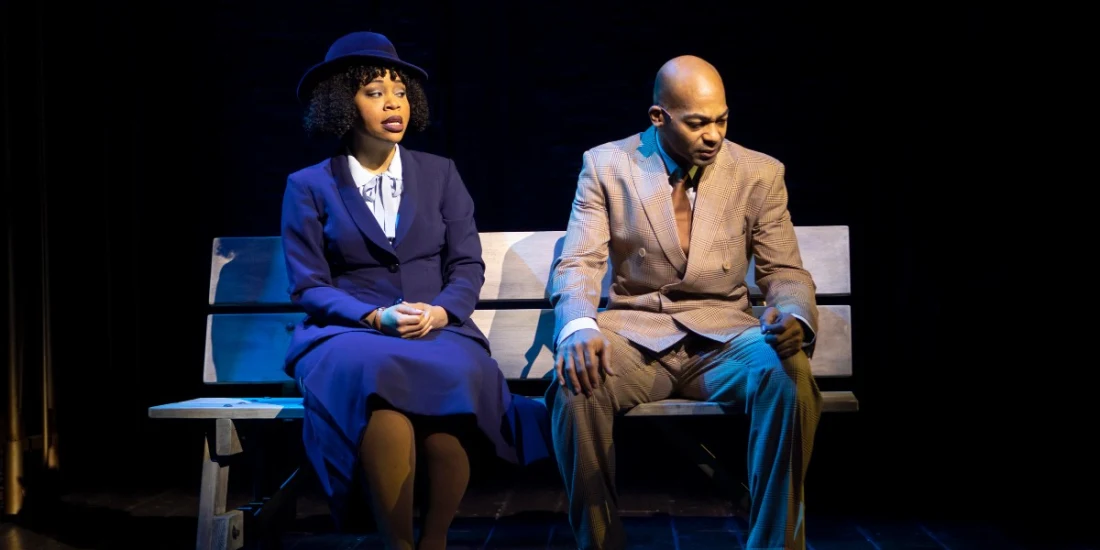'Black No More' Off-Broadway review — a talented cast shines in a poorly conceived musical
The nicest thing I can say about Black No More, the New Group-produced musical at Signature Theatre, is that Tamika Lawrence is giving a Tony and Grammy Award-worthy performance. The cast is uniformly wonderful: Brandon Victor Dixon vamps amusingly enough despite having little actual singing or acting to do as the central Max Disher, a Black man who uses a machine to become white, and Lillias White belts to the rafters as an ancillary character. Sadly, it is all for naught.
The music, lyrics, and book are so full of contrivances ― notwithstanding their lofty goal of criticizing racism ― I could not help laughing at the tragic obviousness of it all.
That's a shame because the creative team is full of accomplished individuals: John Ridley, the Academy award-winning screenwriter of 12 Years of Slave, adapted the book from George S. Schuyler's 1931 novel of the same name. Tariq "Black Thought" Trotter, the two-time Grammy-winning member of The Roots, wrote the lyrics and collaborated with Anthony Tidd, James Poyser, and Tony Award winner Daryl Waters (for Memphis's orchestrations) on the music. Two-time Tony Award winner Bill T. Jones choreographed, and The New Group's artistic director Scott Elliott directed.
What went wrong? In this instance, it wasn't a question of talent; it was a matter of taste and execution.
Black No More takes place during the Harlem Renaissance. Max Disher volunteers as a test subject for Dr. Junius Crookman (Trotter), who has created a machine that turns Black people white. That prompt sounds rich with possibility, but Ridley's book focuses too heavily on exposition and plot, rather than developing or adding dimension to the characters.
The show assumes audiences will simply accept Max's decision to become white, without exploring why. If the idea is that anyone would willingly become white to escape racism, that is racist. Schuyler's book is a clear satire, but what works on the page often fails on stage.
Case in point: After turning white, Max boards a train for Georgia, possibly because he met and shared a dance with Helen (Jennifer Damiano), a white woman who called him the N-word the night before. I say "possibly" because the musical does not interrogate or give reasons behind the characters' decisions. That's the kicker ― without interrogation or dramatic revelation, the plot registers as arbitrary.
Once Max arrives in Atlanta, we know he will see Helen, not because they promised to meet again but because of the musical's fascination with happenstance over character development. Max befriends Helen's father, Reverend Givens (Howard McGuillin), who passes leadership of his Ku Klux Klan-adjacent group to Max over his virulently racist son, Ashby (Theo Stockman), and announces that Helen will marry him before she can meet him.
Helen is outraged, but agrees with little protest or explanation beyond acknowledging a woman's place as a man's property. This sequence could have been its own musical, but gets less than 25 minutes in Black No More.
Max's best friend, Buni (Lawrence, giving the performance of the season), gets the futile task of bringing him back to revive a now-empty Harlem by speaking out against the experiment he eagerly underwent. After protesting and singing a gorgeous lament filled with chirruping belts ("Who's Gonna Take the Weight"), she goes because the libretto has decided it will be so. All comes to a head when Dr. Crookman coincidentally appears, and his pointed revelations unleash tragedy.
What stays with me about this show is not the rhythmically repetitive music ― which seldom advances the plot ― but that even after more than two and a half hours, Max's character remains incognegro: a Black man who doesn't want to be Black, but who fails to reveal why or what he is in interested in besides paying his bills.
I wish the musical had stuck with the book's hilarious, though gruesome, happy ending and honored Schuyler's actual point: that humans behave the same way as their socioeconomic set, regardless of race. I wish that the show had decided upon one tone: high-concept graphic novel, kitchen sink drama, or satire.
Hopefully, Black No More's shortcomings will not prevent other Black creatives from receiving the opportunity to present their brilliance. It's Black History Month, and the tradition of white-led flops should guarantee that Black teams receive as many opportunities.
Photo credit: Tamika Lawrence and Brandon Victor Dixon in Black No More. (Photo by Monique Carboni)
Originally published on
